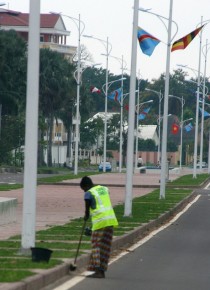I'm the Head of Office for the Department for International Development (DFID) in the Democratic Republic of the Congo. I have been based in the capital city, Kinshasa, for just over a year. This is a challenging and exciting job as we think through how to support poverty reduction in this huge and complex country - the second largest in Africa. I want to use this blog to explore these issues, discuss how we are making hard choices about where to focus the UK aid budget, and to give my insight into what it is like to work for DFID in this fascinating part of the world. So first I want to start close to home, in Kinshasa.

Parts of Kinshasa have been over-run with street sweepers – a novelty here. They have been deployed for the Francophonie that took place in October. The International Organisation of Francophonie brings together countries with a French linguistic, cultural, and colonial heritage – the French equivalent of the Commonwealth Heads of Government. Over 49 countries were represented, with 15 heads of state in attendance – including French President Hollande.
Living in the relatively sheltered quartier of Gombe, on the banks of the Congo river, the main talking point has been the transformation to the urban environment that the Francophonie has brought. Francophonie delegates arrived into a newly glass-clad airport; shiny gilding covering the terminally crumbling terminal building beneath. The road from the airport has been upgraded by the Chinese road crews, and flags of the Francophone nations hang from newly installed street lights. The hotel and conference centre that has been the venue for the event has been decked out in programmable neon lights and a laser. And, if you like your humour dark, the central Kinshasa fire station – which burnt down – was hidden behind Francophonie hoardings.

Local “Kinois” have not been too happy. The Francophonie has (allegedly) diverted scarce resources including electricity and water from their homes. And the rushed improvements demonstrate what can be achieved when there is the necessary will – a stark contrast to everyday life for most of the 10 million people in Kinshasa.
For me, there is one small idiosyncrasy that reveals a broader truth. The army of street sweepers dragooned along the Francophonie route are young men and women dressed in blue overalls, yellow baseball caps, hi-vis jackets and armed with a red-bristled yard brush. Positioned every 50 metres, they each have a small section of Kinshasa’s crumbling road to sweep. Each day they sweep the dirt into neat little piles. Each night, the tropical downpour evenly redistributes the dirt across the road. In a city like Kinshasa and a country like the DRC, dealing with the cosmetic rather than addressing the underlying problems guarantees you a job for life – but little progress.
However, there are also very inspiring stories. At DFID DRC we are working with people committed to making a real long term difference. In my blogs I’ll be sharing accounts of what’s working and lessons we’ve learnt.

1 comment
Comment by Achille Mutombo posted on
I was in US completing my Master degree at MSU law when the francophonie summit took place in Kinshasa. Now back and currently as a lecturer in salvation army university in Kinshasa I am trying to bring awareness among young congolese on real issues they are facing and that it's up to each one of them (or us) both as citizen and intellectuals to improve their environment. Sharing my american experiences is really helpful when dealing sometimes with decreased hope. Sweepers, street sellers, even street fighters are symptoms of a sick society. Thanks for your call.